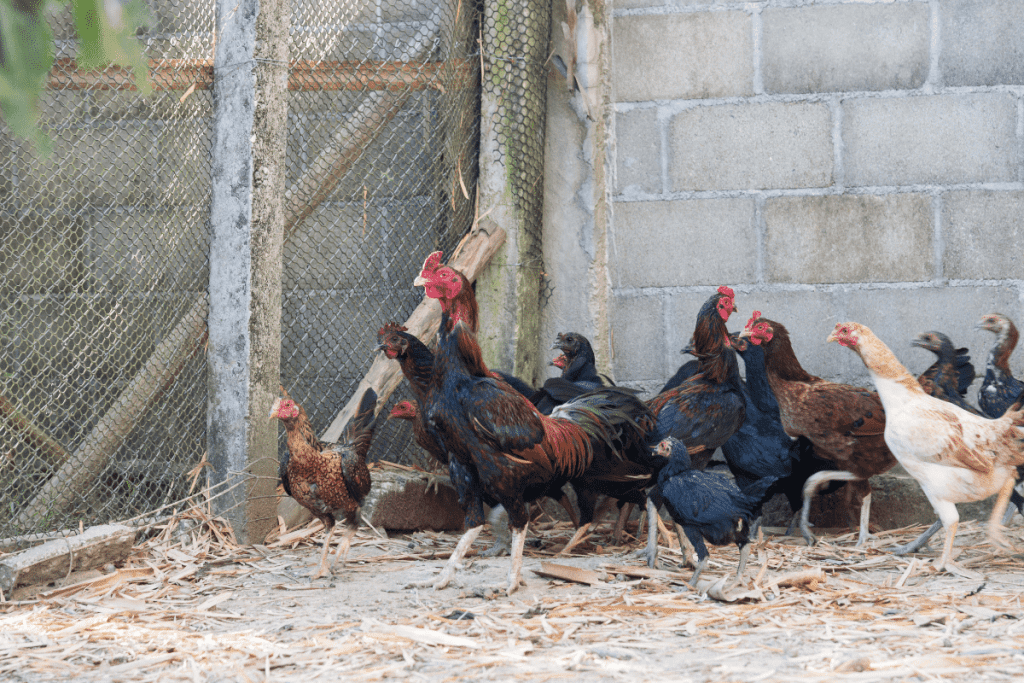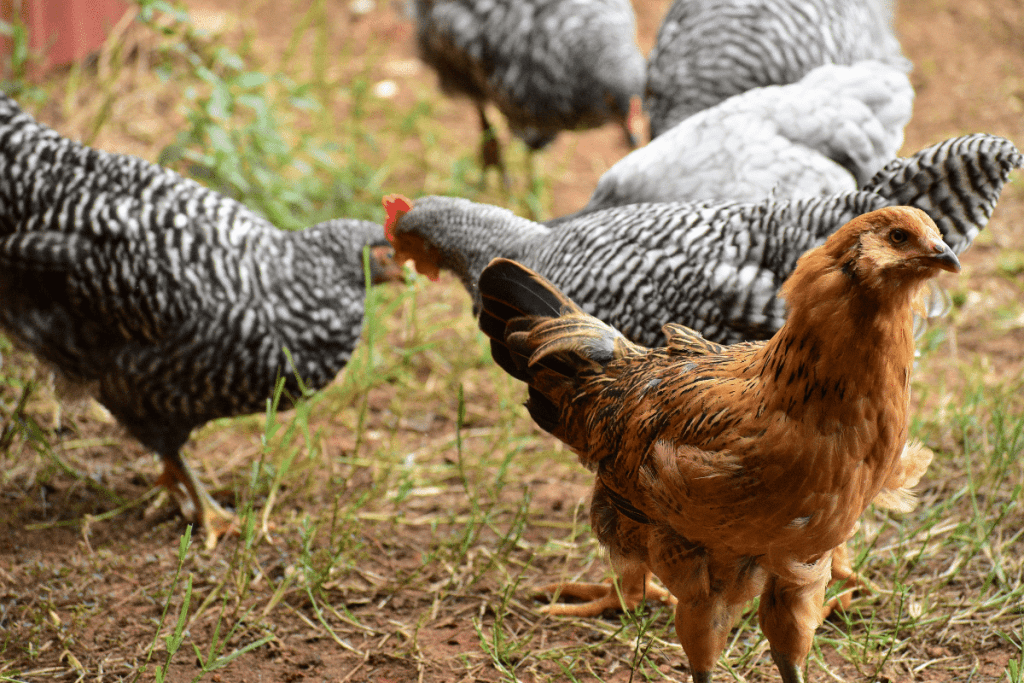We all have weird questions about our pets at times, even regarding their bathroom habits!
If you keep a flock of chickens or simply find them interesting, you’ve probably wondered at some point: do chickens pee?
If so, how do they pee?
Do they pee and poop at the same time?
There’s no shame in asking these strange and surprisingly common questions, so let’s unpack them below!
Chickens do not pee, as they do not have bladders to store urine. Instead, like all other birds, they expel crystallized uric acid, or urates, in their poo. They have a single opening, a cloaca, to handle waste excretion and reproduction.
Read on to learn more about how chickens’ bodies get rid of waste, whether or not they actually “pee” like other animals do, and all the other weird things you probably want to know about their bodily functions but were afraid to ask.

Table of Contents
ToggleDo Chickens Urinate?
Every animal has to get rid of waste somehow, including chickens!
However, how they (and other birds) eliminate their waste is very different from how mammals like us humans do it.
For starters, they lack bladders and urethras, so they technically can’t store or produce pee.
While we have, to put it delicately, a dedicated opening used to expel urine (and another one to expel feces), the urethra, birds instead have a cloaca, a sort of multi-purpose opening which houses birds’ sex organs and is used to expel all metabolic waste.
This is also typical for reptiles, amphibians, and some cartilaginous fishes like sharks!
But birds still produce and need to excrete uric acid crystals, so how do they do so if they aren’t able to pee?
Well, they simply eliminate both their feces and urates simultaneously via their cloaca.
Rather than draining into the bladder and the rectum to be expelled separately, feces and uric acid go straight to the cloaca, where chickens expel a mixture of the two.
Chickens don’t pee liquid but rather expel crystallized uric acid in their poop.
If you’ve ever seen chicken manure in person, you’ve likely noticed it is a mixture of brown/green poo and a small amount of a white substance.
This white substance is uric acid or their “version” of pee!
Interestingly, the word “cloaca” is of Latin origin and essentially translates to “sewer/drain” or “to cleanse.”
The cloaca is also commonly referred to as the vent.
Do Chickens Poop And Pee At The Same Time?
Technically, as we covered above, chickens don’t pee liquid urine like we’re familiar with.
Instead, their uric acid is more of a solid, white, crystallized substance.
So, in a way, they sort of poop and “pee” simultaneously!
Another reason why chickens poop and pee simultaneously is because they only have a single opening to expel both.
Mammals can poop and pee separately since they have separate openings and means of storing each substance by themselves.
As birds lack bladders, their digestive and reproductive systems are connected by the cloaca.
It makes more sense for a chicken’s body (specifically, their kidneys) to produce solid uric acid rather than liquid.
The uric acid simply mixes with their poop and comes out in one solid or semi-solid mass.
Additionally, by not producing or storing liquid urine in a rather heavy bladder, chickens can stay very lightweight, allowing them to run, fly, and move much faster and generally have more energy.
This is one theory as to why they and other birds have evolved to poop and pee simultaneously.
Although chickens are technically unable to truly fly, they can glide short distances, and they’re decently speedy runners!
How Often Do Chickens Pee And Poop?
Birds in general poop a LOT more often than mammals like us humans!
While most mammals poo once per day, birds like chickens poop almost every hour or as often as every 30 minutes!
Smaller birds such as chickens tend to poop the most often, while larger birds like emus or flamingos have slower metabolisms and poop perhaps every other hour.
Essentially, for birds to fly (or glide short distances in the chicken’s case), they must have far lighter bodies than most other animals.
Waste is surprisingly heavy, so birds have evolved to eliminate waste like poo and excess uric acid very often to keep their weight low.
Birds’ metabolisms are very fast in general, which also contributes to their frequent waste excretion.
Although this trait is gross and creates a lot of smelly messes for chicken keepers, it is fascinating how efficient these birds’ digestive systems are!
A healthy chicken will poop anywhere from 15 to more than 30 times a day!
They poop while walking, eating, and even while they sleep.
They don’t have as much control over their sphincters as mammals, so they often poo involuntarily.
Speaking of other types of animals, check out our article talking about why people think chickens are mammals.
What Does Healthy Chicken Poop Look Like?

Healthy chicken fecal material comprises two main parts: a semi-solid brown, greyish-brown, or even greenish-brown irregularly-shaped mass with a small number of white crystals, or uric acid, on top or throughout.
As we covered earlier, the white part is your chicken’s version of “pee.”
The consistency of chicken droppings varies somewhat, though their poo should never be very runny or bloody.
It is more common for chicken poo to be runny and have excess water in the warmer months.
This is because chickens drink more water to stay cool and hydrated in the summer.
Read about how long chickens can go without water.
Like with any animal, your chicken’s diet and the type of food they eat will affect the color of their poop!
If you notice your chickens’ poop is more greenish than brown, this is normal and simply means they’ve been snacking on more plant material than usual.
Cellulose in plant matter doesn’t break down very well in any animal’s poo and usually causes it to have a greenish color.
This is especially common in active, heavily foraging breeds of chickens, as they eat a lot of plant material while grazing.
If your chickens’ poo is more yellow, runny, bloody, or has foreign objects, this often indicates underlying health issues.
Yellow poo, in particular, often indicates kidney malfunction or internal parasites.
Diarrhea is associated with various health issues in chickens, like coccidiosis and other bacterial infections.
Contact a livestock vet if any of your chickens’ poo looks unusual, as certain infections and illnesses will quickly spread throughout an entire flock.
Further reading: What different colors of chicken poop mean.
Do Chickens Poop And Lay Eggs From The Same Opening?
Since chickens only have one opening to handle sexual reproduction and waste excretion, they lay eggs from the same hole they poop!
Chickens’ reproductive and excretory tracts are separate channels on the inside, but they meet just before the cloaca.
As a result, chicken eggs, pee, and poop all get sort of “transferred” to the same channel and come out of the same hole.
It isn’t pretty–in fact, it’s honestly pretty gross–but it sure is efficient!
This also means chickens–again, to put it as delicately as possible–mate via the same opening.
Their vents are very stretchy and durable, so they can push eggs out of the same opening they use for waste excretion reasonably easily.
Do Chickens Fart?
Chickens do, indeed, fart!
Virtually all animals with digestive tracts can pass gas.
As the air gets trapped in small crevices throughout an animal’s intestines, it builds up and eventually has to come out somewhere.
With chickens, gas is simply expelled via the vent/cloaca.
Though they lack bladders, chickens do have intestines.
It’s not the most fun thing to talk about, but chickens (and most animals) need to fart now and then to eliminate bloating and other digestive distress.
Passing gas is essential for your chickens’ health, but you likely won’t ever actually hear them in the act, as they tend to be pretty quiet and discreet.
They often fart while pooping.
Interestingly, they’re also able to burp!
Do Chickens Pee or Sweat Through Their Skin?
This unusual misconception has existed in the hobby farming community for a long time!
However, chickens do not pee, expel urates, or sweat through their skin.
They lack the biological adaptations to do so.
All of a chicken’s urates, or uric acid, are expelled through the cloaca.
Since their digestive systems are already so efficient, they don’t have any reason to have another means of waste disposal.
Chickens also lack sweat glands and are therefore unable to sweat.
This means they have no way to “pee” or expel liquids or solids through their skin.
Rather than sweating to cool themselves off, chickens simply raise their wings slightly and hold them outward from their body.
As a result, air flows under their wings more efficiently, cooling their bodies underneath their dense plumage.
Chickens also pant to regulate their body temperature.
Panting helps to release moisture from their lungs.
Unfortunately, since they can’t sweat, they are prone to occasionally overheating reasonably easily.
Some breeds, however, are hardier in hot weather than others.
Providing chickens with clean, cool, fresh water and plenty of shade is essential in the hot summer months.
How useful was this post?
Click on a star to rate it!
We are sorry that this post was not useful for you!
Let us improve this post!
Tell us how we can improve this post?
